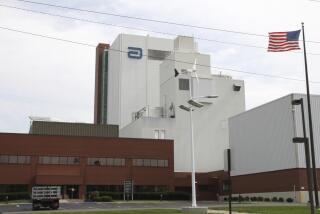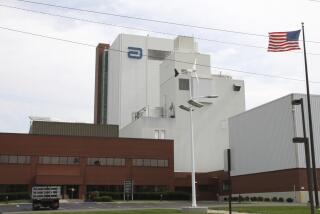Ruling Favors Hybritech’s Patent Claim
- Share via
A federal appeals judge in Los Angeles on Friday upheld a preliminary injunction that prohibits Abbott Laboratories from selling about a dozen testing kits that use monoclonal antibody technology that San Diego-based Hybritech claims to have patented.
Friday’s ruling stemmed from a December, 1986, lawsuit that Hybritech, a wholly owned subsidiary of Indianapolis-based Eli Lilly & Co., filed against Chicago-based Abbott in U.S. District Court in Los Angeles. Early last year, Hybritech won a preliminary injunction that prohibited Abbott from distributing certain tests that detect such medical conditions as cancer, thyroid disorder, pregnancy and hepatitis.
However, the injunction was stayed pending the outcome of an appeal by Abbott. The injunction will be lifted in the “near future,” according to Lilly spokesman Ed West. The preliminary injunction will remain in effect until a full trial is completed, West said.
Abbott spokesman Richard Hamilton said the Chicago-based pharmaceutical company is still reviewing Friday’s ruling. However, Hamilton said the decision will have “no material effect” on Abbott because “we since have engineered new technology that works around” the disputed technology.
The Abbott suit is similar to a 1984 patent-protection lawsuit that Hybritech brought against Mountain View-based Monoclonal Antibodies Inc.
On July 2, 1987, Hybritech announced a settlement agreement with Monoclonal Antibodies that included a $2.25-million payment for past damages. Abbott also agreed to pay royalties to Hybritech in order to continue using the technology in certain testing kits, West said.
Hybritech reported $21.7 million in gross profit and $54.7 million in revenue for 1987. Abbott reported $632.6 million in net income and $4.4 billion in revenue for 1987.
More to Read
Inside the business of entertainment
The Wide Shot brings you news, analysis and insights on everything from streaming wars to production — and what it all means for the future.
You may occasionally receive promotional content from the Los Angeles Times.










